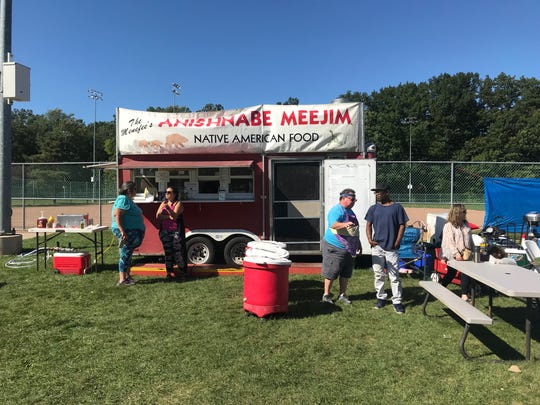KRISTAN OBENG
Lansing State Journal
LANSING, Michigan: The multicoloured ears of corn often seen hanging on doors in the fall have a tastier use. Eva Menefee and her husband, Robin, use the colorful corn to make colorful corn soup, which they serve on a food truck called Anishnabe Meejim. “I make the traditional soup,” Robin, who belongs to the Grand Traverse Band of Ottawa and Chippewa Indians, told the Lansing State Journal. “I take the kernels off the husk and make it soft and edible to eat.”
There aren’t that many places in Michigan that serve Native American food, such as wild rice soup and Indian fry bread. “We don’t have (Native American) restaurants,” says Robin. But he and his wife run a Native American food truck, and they have been bringing Native dishes – and Native culture – to events across Michigan for 35 years. Anishnabe means “People of the Three Fires”, that is – the Ottawa, the Chippewa and the Potawatomi, the three major tribes in Michigan. Meejim means “the things you eat”.
“Many coming to festivals don’t know about Native American food. They may not want to go outside of their (taste) palates,” says Robin. One popular Native American creation is Indian fry bread. The Menefees use it in dishes such as Blanket Dogs, which are “similar to corndogs but better”, Eva explains. It’s also what makes their Indian Tacos different from other tacos. Robin, who often preps and cooks, wraps up traditional taco fixings into fry bread. Robin is also proud of his wild rice soup, a cultural favorite that includes root vegetables and spices.
In addition to being well-loved by Native Americans in the Midwest, wild rice also has historical significance to these tribes. Each time someone orders and tastes wild rice soup, it reminds the Menefees of how important it is that wild rice still exists in Michigan. Robin says early European settlers contributed to the decline of wild rice beds.
Historian Barbara Barton, the author of “Manoomin: The Story of Wild Rice in Michigan” agrees. “There is one last large wild rice bed in the lower peninsula, Tawas Lake,” Barton explains. She added there are a few others that are smaller in the state. After the crop started disappearing, the tribes grabbed canoes and began replanting wild rice, both Barton and Robin Menafee says.
“People with knowledge are teaching the young ones about the (planting) practice to retain the culture,” Robin explains. The Menefees run their food truck business from May to October while maintaining their day jobs and sometimes don’t get a lot of sleep when trying to juggle their careers with their passion for the food business. Eva, who is Oneida, is not only a professor at LCC, but she is also an academic adviser and union president. When the Menefees’ children were younger, Robin had to step back from a position at Michigan State University to focus on the food truck, Eva says. Robin now oversees a non-profit, the Native American Arts and Crafts Council.
In recent years, the Menefees have purposely stuck to events closer to home. “I’m getting old and want to sleep in my own bed. It’s nice to be out but not swamped,” Eva says. Next on the Menefee’s agenda is the the Black Business and Entrepreneur Expo at LCC in October. Then they’ll focus on their day jobs until spring hits. But they plan to keep their food truck rolling along. AP







